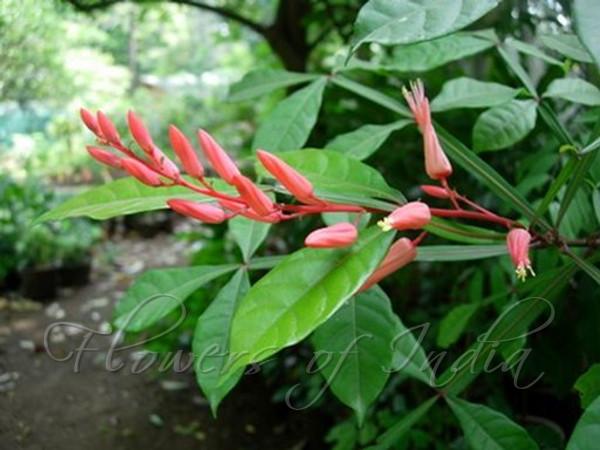|
| Bitter Quassia |
|

|

| File size | 91854 |
| Original date | 10/24/07 9:32 AM |
| Resolution | 600 x 450 |
| Flash | Flash did not fire, auto |
| Focal length | 7.8mm |
| Exposure time | 1/50s |
| Aperture | 2.8 |
| Focus Distance | |
| Metering Mode | Multi-segment |
| Camera make | NIKON |
| Camera model | E5200 |
| Sensor type |
|
|
|
|
Photo: |
Botanical name: Quassia amara Family: Simaroubaceae (Quassia family)
Native to Brazil, Bitter Quassia ia a small forest tree, typically with a
leaning stem, sometimes multiply-stemmed. Leaves are alternate, compound,
with 3-5 leaflets, one terminal and the remaining in opposing pairs. The
rachis between the leaflets is conspicuously winged. The leaves and bark
have an unpleasant bitter flavor if chewed, hence the local name. The
species name amara also means bitter. The flowers are produced in
a panicle 15-25 cm long, each flower 2.5-3.5 cm long, bright red on the
outside, and white inside. They are tubes with a narrow mouth, somewhat
wider at the base. The fruit consists of 4-5 berries held together in a red
receptacle; the fruits themselves are green, then turn black when maturing
early in the dry season. It is famous and used for the bitterwood or
quassia, its heartwood, used as a febrifuge; this contains quassin, a
bitter-tasting substance (it is, in fact, the bitterest substance found in
nature). Extracts of Q. amara bark containing quassinoids are used as
insecticides, being particularly useful against aphids on crop plants.
Flowering: October-February.
Identification credit: Prashant More
| Photographed at Jijamata Udyan, Mumbai. |